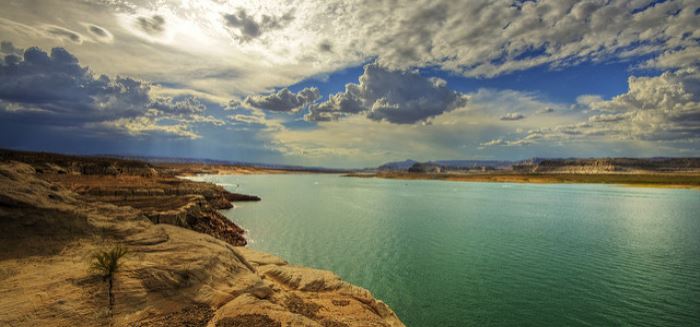Week two of our Stewardship this Lent series takes us to Exodus 17, the story of the Water from the Rock. Cameron Howard, assistant professor of Old Testament, guides us from the grumblings of the Israelites to the longings of our church today. Longing for water, longing for conservation, longing for life. Lent, she argues, is the perfect time to examine our thirst and focus it on God and neighbor.
Yours truly,
Adam Copeland, Center for Stewardship Leaders
Water of Life
Cameron B. R. Howard
The Exodus narrative portrays the Hebrews wandering in the wilderness as a band of faithless whiners. Over and over again the people “murmur” against Moses, doubting his leadership and questioning whether God is really with them. Their complaints are full of drama, to be sure, and filled with memorable rhetorical flourishes. As they are being pursued by the Egyptian army toward the Red Sea, they ask Moses, “Was it because there were no graves in Egypt that you have taken us away to die in the wilderness?” (Exodus 14:11) Once they are safely out of Pharaoh’s reach, they find themselves hungry on their journey, lamenting to Moses and Aaron, “If only we had died by the hand of the LORD in the land of Egypt, when we sat by the fleshpots and ate our fill of bread; for you have brought us out into this wilderness to kill this whole assembly with hunger” (Exodus 16:3).
In this week’s Old Testament lectionary reading, the traveling Hebrews once again speak out against Moses. But this is not another incident in a series of “murmurings” or “grumblings.” The Hebrew verb here is different, implying a strong opposition, even a lawsuit. The NRSV’s translation in v. 2, “quarreled,” makes too light of this conflict; the Israelites are contending with Moses. They are thirsty. They cannot live without water. Their desperation escalates. Again they ask Moses, “Why did you bring us out of Egypt, to kill us and our children and livestock with thirst?” Surely we cannot blame them for their doubt and frustration, with their lives teetering on the brink. They are not faithless whiners, they are thirsty, dying people. They need to know: is the LORD among them, or not?
As I reflect on this text, I’m drawn first to the reminder that water has been, since the beginning of the earth itself, the most essential resource for life. The United Nations reports that 783 million people in the world do not have access to clean water, and global water supplies continue to shrink. We may not have Moses’ staff around to coax water out of rocks, but churches can take concrete steps around their own buildings and property to lead communities in conservation efforts.
Several years ago, my own congregation turned the mundane task of replacing the parking lot into an opportunity to add pervious pavers and multiple rain gardens to the property, dramatically reducing storm water runoff and providing space for native plants and trees to flourish. As Lent ushers in the spring, it can be a great time to conduct a water audit or research local grant opportunities for conservation-oriented property improvements.
At the same time, this text also moves me to consider the way lack of water can operate as a metaphor. Many congregations and faith-based institutions I know are “thirsty” right now: thirsting for money, for human resources, for strong leadership, for survival. It is no wonder we wax nostalgic about the “good ol’ days,” when we sat by the fleshpots of full pews and overflowing collection plates. The Hebrews’ desire to return to Egypt shows how difficult it is for them to take the long view of their journey. When their throats are parched, how can they see the vision of life under God that lies ahead of them? How can they open their eyes to God’s presence with them even now? Their sights are set on the last place they knew bread and water, and they are too dehydrated to turn around and face the promise of Canaan.
If you shepherd a thirsty congregation, how will you help them see that the Lord is indeed among them? Over and over again the Israelites grumbled against Moses; over and over again Moses pointed them toward God, who always provided something life-giving. During these forty days of reflection, consider what your community is thirsting for, and what nourishment they need to reorient themselves toward the newness to which God pulls them.
Check out the rest of the Stewardship this Lent series:
Stewardship this Lent by Adam J. Copeland
The Arc of Stewardship in the Age of Abundance and Debt by Israel Galindo
Stewardship in the Valley of Dry Bones by Benjamin Stewart
Stewardship’s Null Curriculum by Rolf Jacobson
More Information
Dr. Cameron B. R. Howard is Assistant Professor of Old Testament at Luther Seminary.

